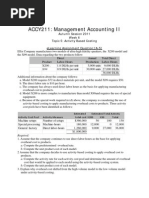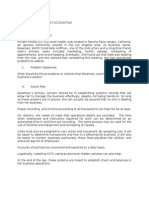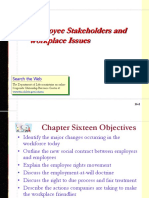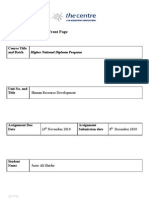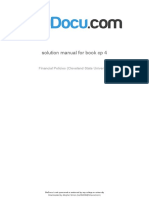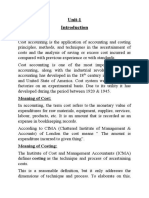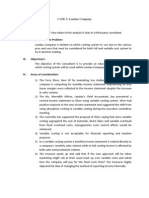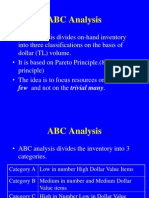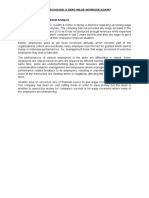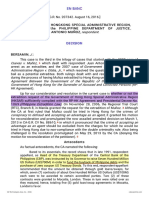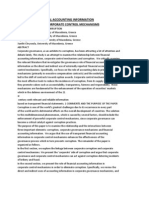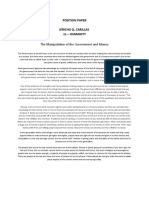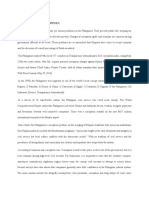0 ratings0% found this document useful (0 votes)
317 viewsBusiness Ethics - Chp8
Business Ethics - Chp8
Uploaded by
Sueraya ShahThis document discusses three models of business organizations and the ethical obligations of employees and employers. It covers the rational structure model which emphasizes formal command and duties. The political model focuses on power dynamics. The caring organization model challenges authoritarian assumptions. The rational model views the organization chart and efficiency as most important. Contracts obligate employees to loyally pursue goals and employers to provide just wages and conditions. Employees have duties of obedience, avoidance of harm, and pursuing goals. Employers have duties to provide fair wages, consider costs of living, and ensure health and safety. Conflicts of interest, gifts, theft, trade secrets, and insider trading are also examined.
Copyright:
© All Rights Reserved
Available Formats
Download as PPTX, PDF, TXT or read online from Scribd
Business Ethics - Chp8
Business Ethics - Chp8
Uploaded by
Sueraya Shah0 ratings0% found this document useful (0 votes)
317 views36 pagesThis document discusses three models of business organizations and the ethical obligations of employees and employers. It covers the rational structure model which emphasizes formal command and duties. The political model focuses on power dynamics. The caring organization model challenges authoritarian assumptions. The rational model views the organization chart and efficiency as most important. Contracts obligate employees to loyally pursue goals and employers to provide just wages and conditions. Employees have duties of obedience, avoidance of harm, and pursuing goals. Employers have duties to provide fair wages, consider costs of living, and ensure health and safety. Conflicts of interest, gifts, theft, trade secrets, and insider trading are also examined.
Original Description:
Based on Business Ethics: Concept & Cases, Manuel G.Velasquez (7th edition)
Original Title
Business Ethics_Chp8
Copyright
© © All Rights Reserved
Available Formats
PPTX, PDF, TXT or read online from Scribd
Share this document
Did you find this document useful?
Is this content inappropriate?
This document discusses three models of business organizations and the ethical obligations of employees and employers. It covers the rational structure model which emphasizes formal command and duties. The political model focuses on power dynamics. The caring organization model challenges authoritarian assumptions. The rational model views the organization chart and efficiency as most important. Contracts obligate employees to loyally pursue goals and employers to provide just wages and conditions. Employees have duties of obedience, avoidance of harm, and pursuing goals. Employers have duties to provide fair wages, consider costs of living, and ensure health and safety. Conflicts of interest, gifts, theft, trade secrets, and insider trading are also examined.
Copyright:
© All Rights Reserved
Available Formats
Download as PPTX, PDF, TXT or read online from Scribd
Download as pptx, pdf, or txt
0 ratings0% found this document useful (0 votes)
317 views36 pagesBusiness Ethics - Chp8
Business Ethics - Chp8
Uploaded by
Sueraya ShahThis document discusses three models of business organizations and the ethical obligations of employees and employers. It covers the rational structure model which emphasizes formal command and duties. The political model focuses on power dynamics. The caring organization model challenges authoritarian assumptions. The rational model views the organization chart and efficiency as most important. Contracts obligate employees to loyally pursue goals and employers to provide just wages and conditions. Employees have duties of obedience, avoidance of harm, and pursuing goals. Employers have duties to provide fair wages, consider costs of living, and ensure health and safety. Conflicts of interest, gifts, theft, trade secrets, and insider trading are also examined.
Copyright:
© All Rights Reserved
Available Formats
Download as PPTX, PDF, TXT or read online from Scribd
Download as pptx, pdf, or txt
You are on page 1of 36
Business Ethics
Concepts & Cases
Manuel G. Velasquez
Chapter Eight
Ethics and the Employee
Three models of the business
organization
The rational structure model, by its emphasis on formal
relations of command and division of labor, highlights issues
regarding empolyee-firm and firm-employee duties.
The political model with its focus on competing coalitions and
informal exercises of power, highlights issues regarding abuses
of power and related employee rights.
The caring organization model, with its focus on nonpower
relations of cooperation, challenges authoritarian and
competition-based assumptions about how business
organizations do and should work.
The Rational Model of a Business Organization
• Formal hierarchies identified in the organizational
chart are the firm’s fundamental realities.
• Organizations seek to coordinate the activities of
members so as to achieve their goals with
maximum efficiency.
• Information rises from the bottom of the
organization to the top.
• Contracts obligate the employee to loyally pursue
the organization’s goals and the employer to
provide a just wage and just working conditions.
The Employee's Obligations to the Firm
• Main Duty: to work towards the goal of the firm
▫ obedience to superiors
▫ avoidance of activities which might be harmful to these
goals, such as"white collar crime" = illegal pursuit of
activities harmful to these goals; mismanagement of
funds; malingering, absenteeism, etc.
• Law of Agency: "agents" = employees; "principals" =
employers
▫ specifies the legal duties of employees toward their
"principles," or employer.
▫ The employee must pursue the firm's goals and do
nothing that conflict with them while working for the
firm.
CONFLICT OF INTEREST
A conflict of interest exists when an employee or officer in in
company is engaged, for the company in carrying out a task in
which the employee has a private interest possibly contrary to the
interests of the company substantial enough that it reasonably
might affect the employee's judgment
When conflicts of interest involve a financial relationship, it is
sometimes called an objective conflict of interest.
When it involves an emotional tie or other kind of relationship, it is
sometimes called a subjective conflict of interest.
Examples
• Financial: a corporate officer involved in deciding on bids from
subcontractors when he or she holds stock in one of the bidding
companies
• Non financial: a personnel officer involved in hiring decisions
involving close relatives
TYPES OF CONFLICT OF INTERESTS
• Conflicts of interest may be actual or potential.
• A potential conflict of interest occurs when an employee
has an interest that could influence what he does for his
company if the employee were performing a certain task
for his company, but he has not yet been given the task.
• That would be called a potential conflict of interest.
• If that employee is actually given the task to perform
under the same conditions, an actual conflict of interest
would exist.
• An apparent conflict of interest would exist if an
employee has no actual conflict of interest but other
people might view the situation and wrongly believe that
there is an actual conflict of interest.
Avoiding or Eliminating a Conflict of
Interest
• Removing oneself from the task in which the
conflict of interest arises.
• Eliminating the interest that creates the conflict
of interest.
• Eliminating or changing the obligation of serving
the employer’s interests and remaining free of
any incentive to serve another interest while
serving the employer.
Commercial bribes &
Commercial extortion
Commercial bribes and extortion are
obviously unethical and create clear conflicts of
interest.
• Commercial bribes – a consideration given or offered to an
employee by a person outside the firm with the understanding that,
when the employee transacts business for the firm, the employees
will deal favourably with that person or that person’s firm.
▫ example: a supplier who offers a purchasing agent a
"kick back" for placing orders with them rather than
competitors.
• Commercial extortion – Occurs when an employee demands a
consideration from persons outside the firm as a condition for
dealing favourably with those persons.
▫ purchasing agent who demands a "kick back" from suppliers as a
condition for placing orders with them rather than competitors.
• Commercial gifts: considerations given or offered to an employee by
a person outside the firm with no understanding that the employee
will deal favorably with them.
▫ Moral issue: the fine line between a gift and a bribe.
Ethics of Accepting Gifts
(Vincent Barry)
Factors to be considered when evaluating the morality
of accepting a gift:
1. What is the value of the gift?
2. What is the purpose of the gift?
3. What are the circumstances under which the gift
was given?
4. What is the position of the recipient?
5. What is the accepted business practice in the area?
6. What is the company's policy?
7. What is the law?
Employee Theft
• Employees have a contractual agreement to accept only
specific benefits in return for their services and to use the
firm's resources for the good of the firm.
• Any other use of company resources and any other
appropriation of benefits by the employee counts as
theft.
• Though theft is often petty (such as the stealing of office
supplies or the padding of expense accounts), it extends
to white-collar crimes such as embezzlement, larceny,
fraud, and forgery.
Computer and Information Theft
the unauthorized examination, use, or copying
of computer information or programs – is held
to be theft notwithstanding the intangible
nature of the property taken.
Example: Copying a company's software or
data, or using a company computer for
personal business (unless explicitly allowed).
Theft of information also includes digitized
programs, music, movies, e-books, etc. as well
as proprietary formulas or other data.
TRADE SECRETS
• Propriety information or "trade secrets" is
information that the company owns
• concerning its activities, which it explicitly
indicates that it does not want others to have.
• Sharing such information is also unethical.
• Example the formula for Coca Cola nature.
• Skills acquired through working for the firm,
however, are considered parts of the employee's
person and not property of the employer, and do
not count as trade secrets.
INSIDER TRADING
Buying or selling stock in a corporation on the
basis of "inside" information about the company
"inside information" refers to proprietary
information about a company, not available to
those outside the company, which would have a
material or significant impact on the price of the
company’s stock if known.
The Ethics of Insider Trading
• Insider trading is said to be unethical because it is theft of
information that gives the insider an unfair advantage.
• It has been defended because :
(a) it ensures stock prices reflect the true value of the stock
(b) it harms no one
(c) having an advantage over others in the stock market is not wrong
in itself and is common among experts
• These defenses have been criticized because:
(a) the information the insider uses is not his or hers and so is stolen
(b) trading on inside information has harmful effects on the stock
market and increases the costs of buying and selling stocks
(c) the advantage of the inside trader is not like the advantage of an
expert because it is based on theft.
The Firm's Duties to the
Employee
A firm's main moral duty to its employees is to provide them
with a fair wage and fair working conditions.
Setting a fair wage is both important and difficult balancing the
employer’s interest in minimizing costs and the workers’ interest
in providing a decent living for themselves and their families.
What's a fair wage? employees want higher wages while
employers want to minimize production costs (including labor)
Fair Wages
Fair wages depend on:
1. What is the going wage in the industry and the area?
2. What are the firm's capabilities?
3. What is the nature of the job including its risks, skill
requirements and demands?
4. What are the minimum wage laws?
5. What are the other salaries in the firm?
6. Were wage negotiations fair?
7. What are the local costs of living?
Working Conditions: Health and Safety
• Issues regarding the fairness of working conditions arise,
principally, concerning health and safety, and job
satisfaction.
• Statistics show that workplace injuries are frequent and
often serious.
• Unavoidable risks incurred in some occupations are
acceptable so long as workers are well compensated for
accepting these risks, and freely and knowingly accept
them in exchange.
• Morally problematic cases arise when workers incur
risks unknowingly because they lack the time or
expertise to judge the hazards of a job they accept; where
risks are unknown; or where workers accept known risks
out of desperation due to uncompetitive labor markets.
Employer Guidelines
• Risk in the workplace is an unavoidable part of
many occupations.
• So if employers take the following precautions, the
employer can be said to have acted ethically:
1. Takes reasonably adequate measures to inform
him or herself of his and his or her workers about
workplace risks and eliminates workplace risk.
2. Fully compensates and insures workers for
assuming risks that cannot be eliminated.
3. The workers freely and knowingly accept those
remaining risk in exchange for the added
compensation.
Establishing Fair Working Conditions
• Eliminating risks when cost is reasonable, studying
potential risks of a job, informing workers of known
risks, compensating workers for injuries.
– Providing compensation for job risks similar to risk
premiums paid in other jobs.
– Providing adequate medical and disability benefits.
– Working with other firms to collect information
about job risks.
Moral Responsibility for Working Conditions
• Employer is morally responsible for bad
working conditions if the employer:
▫ Can and should improve conditions
▫ Knows about the conditions
▫ Is not prevented from changing conditions
ORGANZATIONAL POLITIC
The processes in which individuals or groups within an
organization use nonformally sanctioned power tactics to
advance their own aims.
Because organizational politics aim to advance the interests
of an individual or group, political individuals tend to be
covert, which means that they can easily become deceptive
or manipulative.
POLITICAL ORGANIZATION
• The political model of the organization focuses on real – both official and
unofficial – power and authority relations.
• Organizations are conceived of as systems of competing power coalitions
with formal and informal lines of influence and communication radiating
from each.
• The fundamental organizational reality, on this conception, is power,.
• The principal moral issues arising on the political model, consequently,
concern the moral limits on the exercise of power within organizations:
employee rights issues concern the moral limits on the power superiors
acquire and exercise over subordinates; office politics issues concern the
moral limits on the power of employees acquire and exercise over one
another.
• If power is the main organizational reality, then the primary ethical
problems in an organization are connected with acquiring and exercising
power.
2 Main Questions:
1. What are the moral limits to the power managers
acquire and exercise over their
subordinates?
2. What are the moral limits to the power employees
acquire and exercise on each other?
With regard to employee rights, a comparison may
be drawn between the defining features of political
or governmental authority and of corporate
management.
Similarity Argument
• Similarities between the power of management and government
imply employees should have rights similar to citizens’ rights.
▫ A company’s management is a centralized decision-making
body that exercises power, like a government.
▫ Managements wield power and authority over employees, like
governments wield over citizens.
– Management has the power to distribute income, status, and
freedom among the corporation’s constituencies, like
government does with respect to citizens.
– Management shares in the monopoly on power that
government possesses.
– Since management’s power over employees is so similar to
government’s power over citizens, employees should have
rights that protect them from managers’ power, just as citizens’
rights protect them from government power.
Replies and Counter-Replies to Similarity
Argument
• Power of government is based on consent and so is unlike
the power of managers which is based on ownership of the
company, but supporters of similarity argument respond
that today power of managers does not come from owners.
• Unlike government, the power of management is limited by
unions, but supporters of similarity argument respond that
most workers today are not unionized.
• While it is hard for citizens to escape the power of a
government, it is easy for employees to escape the power of
managers by changing jobs, but supporters of similarity
argument respond that changing jobs is not always so easy.
Freedom of Conscience
• Employees may discover, in the course of doing their job, that a
corporation is doing something wrong or injurious to society commonly
insiders are the first to become aware of matters of potential moral
concern, e.g., defective products, polluting practices, unsafe working
conditions & illegal activities.
• Bringing the matter to the attention of supervisors may be ineffective or
ruled out: supervisors might not want to know to avoid complicity, or
already know and be be complicit.
• On the other hand, if the employee goes public with the information, this
is legally considered just cause for termination as a breech of the
employee's duties of loyalty and confidentiality to the firm.
• Often employers will put the matter on the employees record and attempt
to see to it that they are "black-balled" throughout the industry.
• Many argue that this situation is in violation of individuals' rights of
conscience, i.e., their right to adhere to their moral and religious
convictions without being forced to cooperate in activities they believe
are wrong.
Whistleblowing
The attempt by an employee to disclose wrongdoing in
an organization, can take two forms.
It is internal if it is reported only to management within
the organization.
If it is reported to others (such as governmental
agencies or the media), then it is external.
Argument against external whistleblowing
• Employee has a contractual obligation to be loyal
to their employers and keep inside information
confidential external whistleblowing is a
violation of that obligation so, external
whistleblowing is always wrong.
• Defenders of whistleblowing reply that
contractual obligations are not unqualified and,
in particular, that contracts requiring parties to
do something illegal or immoral are void.
Whistle blowing is morally justified
• External whistleblowing is morally permissible and may even be
obligatory if it is necessary to prevent a wrong one morally ought
to prevent or to bring about a good one morally ought to bring
about; provided:
1. there is clear, substantiated, and reasonably comprehensive
evidence of harmful activity or wrongdoing;
2. that reasonable attempts at internal whistleblowing have failed;
3. that it is reasonably sure that the external whistleblowing will
stop the activity; and
4. that the wrong or harm the whistleblowing will prevent
outweighs the harm it will cause to parties such as stockholders,
superiors, and fellow employees.
Additional conditions
• Whistleblowing is a moral obligation for a
person when (1)–(4) hold, and, in addition:
▫ the person has a special duty to prevent the
wrong or is the only person who will or can
prevent the wrong
▫ the wrong involves an extremely serious harm
to society’s welfare, or extremely serious
injustice, or extremely serious violation of
rights.
ORGANIZATIONAL POLITIC
Organizational politics is defined as the process by which
individuals or groups within an organization use non-
formally sanctioned tactics (political tactics) to advance their
own aims. (Such aims are not necessarily in conflict with the
best interests of the organization.) Because organizational
politics aim to advance the interests of an individual or
group, political individuals tend to be covert, which means
that they can easily become deceptive or manipulative
POLITICAL TACTICS
1. Blaming or attacking others.
2. Controlling information.
3. Developing a base of support for one's ideas.
4. Image building.
5. Ingratiation.
6. Associating with the influential.
7. Forming power coalitions and developing
strong allies.
8. Creating obligations.
Characteristics of the Caring Model of
Organization
• The primary goal of the organization is not profit, but
caring for those individuals who make up the
organization and with whom the organization interacts.
• The characteristics of a caring model of the
organization would be focused entirely:
▫ Caring is focused entirely on persons, not on “profit” or
“quality.”
▫ Caring is undertaken as an end in itself not as a means to
productivity.
▫ Caring is essentially personal.
▫ Caring is growth-enhancing for the cared-for.
Problems for the Caring Organization
• Caring too much for others which can lead to
“burnout” when the needs of others are given too
much weight compared to the needs of the self.
• Not caring enough for others because fatigue, self-
interest, or disinterest leads us to ignore their
needs.
• The organization systematically drives out caring
with layoffs, bureaucracy, managerial styles that
see employees as disposable, or rewards that
encourage competitiveness and discourage caring.
You might also like
- Ad476-South Africans See Corruption As Worsening Under Ramaphosa-Afrobarometer Dispatch-15sept21Document12 pagesAd476-South Africans See Corruption As Worsening Under Ramaphosa-Afrobarometer Dispatch-15sept21DocumentsZA100% (1)
- Week 6 Question PDFDocument1 pageWeek 6 Question PDFBella Seah0% (1)
- NIKE Inside The Lines Code of Conduct November 2020Document36 pagesNIKE Inside The Lines Code of Conduct November 2020noreen castro0% (1)
- CK MN: Chapter #9 Assignment QuestionDocument6 pagesCK MN: Chapter #9 Assignment QuestionSamking JamesNo ratings yet
- Hilton Chapter 13 SolutionsDocument71 pagesHilton Chapter 13 SolutionsSharkManLazersNo ratings yet
- Case 15-1 - Private Fitness LLCDocument1 pageCase 15-1 - Private Fitness LLCMac Itaralde0% (1)
- Activity-Based Costing Classic Pen CaseDocument73 pagesActivity-Based Costing Classic Pen CaseRohin Kesar100% (4)
- Topic 3 TO MEASURE COST BEHAVIOR USING HIGH LOW AND REGRESSION METHODDocument3 pagesTopic 3 TO MEASURE COST BEHAVIOR USING HIGH LOW AND REGRESSION METHODSueraya ShahNo ratings yet
- CULTURE and CORRUPTION Study - SeleimBontisJIC (Business - Mcmaster.ca) PDFDocument20 pagesCULTURE and CORRUPTION Study - SeleimBontisJIC (Business - Mcmaster.ca) PDFNashwa Saad100% (1)
- Ethical Purchasing Practices-Knowledge How ToDocument18 pagesEthical Purchasing Practices-Knowledge How ToHamza RehmanNo ratings yet
- SMETA Audit Criteria GuideDocument24 pagesSMETA Audit Criteria Guidetony s100% (2)
- Etika Bisnis Chapter 8Document20 pagesEtika Bisnis Chapter 8Dayu MirahNo ratings yet
- IB - Hills - Chapter 09Document18 pagesIB - Hills - Chapter 09Nahid Tasneem TasneemNo ratings yet
- Chapter 10 - Parkin - PowerPointDocument12 pagesChapter 10 - Parkin - PowerPointAsandeNo ratings yet
- Case Study-HR Best Practice 2012-Great SampleDocument14 pagesCase Study-HR Best Practice 2012-Great SampleAltanaOshadaNo ratings yet
- CH 07organizational Factors-The Role of Ethical Culture and RelationshipsDocument23 pagesCH 07organizational Factors-The Role of Ethical Culture and RelationshipsRodela Binta AliNo ratings yet
- Mployee Stakeholders and Workplace IssuesDocument25 pagesMployee Stakeholders and Workplace IssuesAlexander Agung HRDNo ratings yet
- Analysis of Crown Point Cabinetry-By Group JDocument2 pagesAnalysis of Crown Point Cabinetry-By Group Jvinayak1511No ratings yet
- Designing and Managing ServicesDocument6 pagesDesigning and Managing ServicesjahanNo ratings yet
- Chap 028Document12 pagesChap 028Rand Al-akam100% (1)
- Crown Point Cabinetry Case StudyDocument3 pagesCrown Point Cabinetry Case StudyMuhammad Zakky AlifNo ratings yet
- Miller and Modigliani TheoryDocument3 pagesMiller and Modigliani TheoryAli SandhuNo ratings yet
- OB 33 BS 16 Employee Stakeholders and Workplace IssuesDocument25 pagesOB 33 BS 16 Employee Stakeholders and Workplace IssuesberitahrNo ratings yet
- Reinventing The Wheel at Apex Door CompanyDocument11 pagesReinventing The Wheel at Apex Door Companyjuzzy52100% (1)
- Solution Manual For Book CP 4Document107 pagesSolution Manual For Book CP 4SkfNo ratings yet
- Topic 2 Competitiveness, Strategy, and Productivity: ProblemsDocument2 pagesTopic 2 Competitiveness, Strategy, and Productivity: ProblemsMark Roger Huberit IINo ratings yet
- Software Associate SolutionDocument6 pagesSoftware Associate SolutionAnupam SinghNo ratings yet
- Unit-1 Introduction Cost AccountingDocument23 pagesUnit-1 Introduction Cost AccountingShylaja NagNo ratings yet
- ABC CostingDocument7 pagesABC CostingNafiz RahmanNo ratings yet
- PHT and KooistraDocument4 pagesPHT and KooistraNilesh PrajapatiNo ratings yet
- Piedmont Univeristy PDFDocument7 pagesPiedmont Univeristy PDFDjoaneNo ratings yet
- C09 +chap+16 +Capital+Structure+-+Basic+ConceptsDocument24 pagesC09 +chap+16 +Capital+Structure+-+Basic+Conceptsstanley tsangNo ratings yet
- Theories of ProfitDocument39 pagesTheories of Profitradhaindia100% (1)
- 19e Section6 LN Chapter09Document10 pages19e Section6 LN Chapter09benbenchenNo ratings yet
- Chapter 4 (Core Competencies, Resources, & Capabilities)Document4 pagesChapter 4 (Core Competencies, Resources, & Capabilities)Sagita RajagukgukNo ratings yet
- Classic Pen CompanyDocument4 pagesClassic Pen Companyfundu1230% (2)
- Hilton CH 10 Select SolutionsDocument24 pagesHilton CH 10 Select SolutionsRaza Ze0% (1)
- ManagerialAccounting - 6E Atkinson6e - PPT - ch06REVISEDDocument23 pagesManagerialAccounting - 6E Atkinson6e - PPT - ch06REVISEDالهيثم الحيدريNo ratings yet
- Decision MakingDocument12 pagesDecision MakingHanisa HanzNo ratings yet
- Case OBDocument4 pagesCase OBSoumya Ranjan SwainNo ratings yet
- Hansen AISE IM Ch07Document54 pagesHansen AISE IM Ch07AimanNo ratings yet
- Case-Study - Private FitnessDocument4 pagesCase-Study - Private FitnessIndustry ReportNo ratings yet
- MIS AssignmentDocument9 pagesMIS AssignmentSachin NarulaNo ratings yet
- LandauDocument8 pagesLandauJenny Joy SedigoNo ratings yet
- ABC Analysis and EOQDocument33 pagesABC Analysis and EOQPreeti Yadav100% (2)
- Chap 005Document88 pagesChap 005palak32100% (1)
- Perfect CompetitionDocument43 pagesPerfect CompetitionMohammad Raihanul HasanNo ratings yet
- Chapter 1 An Overview of Financial MangementDocument47 pagesChapter 1 An Overview of Financial MangementKhurram MirzaNo ratings yet
- Siemens Case Study (Raziyeh, Karim & Manpreet)Document4 pagesSiemens Case Study (Raziyeh, Karim & Manpreet)ChunniNo ratings yet
- MA Session 6 PDFDocument48 pagesMA Session 6 PDFArkaprabha GhoshNo ratings yet
- Hospital Supply, Inc.: EXHIBIT 1 Costs Per Unit of Hydraulic HoistsDocument3 pagesHospital Supply, Inc.: EXHIBIT 1 Costs Per Unit of Hydraulic HoistsnirajNo ratings yet
- Malden MillsDocument3 pagesMalden MillsBrian Watts100% (1)
- CSR Case StudyDocument14 pagesCSR Case StudyBushra ChowdhuryNo ratings yet
- 5 Myths of EntrepreneurshipDocument3 pages5 Myths of EntrepreneurshipRitesh KumarNo ratings yet
- SMA 06 IntA 01 TermPaper UnileverDocument11 pagesSMA 06 IntA 01 TermPaper Unileveraidil fikri ikhsanNo ratings yet
- A Zero Wage Increase Again - Situational AnalysisDocument1 pageA Zero Wage Increase Again - Situational AnalysisRahul Kashyap100% (1)
- Macro Level Man Power PlanningDocument10 pagesMacro Level Man Power Planningsuvobroto banerjeeNo ratings yet
- Chapter 13: Advanced Topics in Business Strategy Answers To Questions and ProblemsDocument5 pagesChapter 13: Advanced Topics in Business Strategy Answers To Questions and ProblemsardiNo ratings yet
- SCM Fall 17 - 2 - Drivers and Obstacles-UpdatedDocument15 pagesSCM Fall 17 - 2 - Drivers and Obstacles-UpdatedMYawarMNo ratings yet
- CH 4 Job Costing PDFDocument11 pagesCH 4 Job Costing PDFMohamed DiabNo ratings yet
- Lecture 13 12102022 094349pmDocument18 pagesLecture 13 12102022 094349pmawais mghalNo ratings yet
- Ethic CHPT 8Document33 pagesEthic CHPT 8Michaela SchmidtNo ratings yet
- Resume Business Ethics Concepts & Cases Chapter 8Document27 pagesResume Business Ethics Concepts & Cases Chapter 8dillanNo ratings yet
- Moral Choices Facing EmployeesDocument19 pagesMoral Choices Facing EmployeesAngelo RamosNo ratings yet
- The Individual in The Organisation: Thinking and Managing EthicallyDocument44 pagesThe Individual in The Organisation: Thinking and Managing Ethicallyamitrao1983No ratings yet
- Commercial Bribes and Extortions: BribeDocument10 pagesCommercial Bribes and Extortions: BribesarlagroverNo ratings yet
- Topic 6 Activity Base CostingDocument10 pagesTopic 6 Activity Base CostingSueraya ShahNo ratings yet
- Topic 1 Managerial Acctg and Business EnvDocument7 pagesTopic 1 Managerial Acctg and Business EnvSueraya ShahNo ratings yet
- Business Ethics - Chp3Document33 pagesBusiness Ethics - Chp3Sueraya ShahNo ratings yet
- Polices Preventing Corroupt PaymentDocument14 pagesPolices Preventing Corroupt Paymentأحمد خيرالدين عليNo ratings yet
- 11 HK SAR v. MunozDocument19 pages11 HK SAR v. MunozjrNo ratings yet
- DefinitionDocument2 pagesDefinitionJiana NasirNo ratings yet
- The Role of Financial Accounting InformationDocument16 pagesThe Role of Financial Accounting InformationPrateek Gupta100% (1)
- 065 Alejandrino v. de LeonDocument2 pages065 Alejandrino v. de LeonErika Potian100% (1)
- The Methods of Shaytaan in Leading People Astray by Shaykh Aboo Islaam Saalih Bin Taha 'AbdulWaahidDocument21 pagesThe Methods of Shaytaan in Leading People Astray by Shaykh Aboo Islaam Saalih Bin Taha 'AbdulWaahidMountainofknowledge100% (3)
- Wi Ptsi Hse 041 e r03Document30 pagesWi Ptsi Hse 041 e r03Hanafiah RozaliNo ratings yet
- E&V 3rd WeekDocument13 pagesE&V 3rd WeekD ChinmayNo ratings yet
- IBE Assignment DHRM2 (Group 4) - DONEDocument26 pagesIBE Assignment DHRM2 (Group 4) - DONENur Fateha NajwaNo ratings yet
- Sir Brits Mid Ex. QuestionDocument5 pagesSir Brits Mid Ex. QuestionCheche Gabato EspinosaNo ratings yet
- Position PaperDocument1 pagePosition PaperJericho CarillasNo ratings yet
- Anatomy of FraudDocument295 pagesAnatomy of Fraudjcescalier100% (3)
- 2 CBMEC 1 Strategic Management Pitfalls Guidelines and Ethics in Strategic ManagementDocument28 pages2 CBMEC 1 Strategic Management Pitfalls Guidelines and Ethics in Strategic ManagementMc VillafrancaNo ratings yet
- Criminal Law 2 Reviewer 2Document62 pagesCriminal Law 2 Reviewer 2Won LeeNo ratings yet
- Generic Structure and Language FeaturesDocument28 pagesGeneric Structure and Language FeaturesFauzan Khairani100% (4)
- Unethical Practices in ConstructionDocument17 pagesUnethical Practices in Constructionkeiroly100% (1)
- Juan Carlo Castaneda Criminal Law 2 DigestDocument6 pagesJuan Carlo Castaneda Criminal Law 2 DigestJuan Carlo CastanedaNo ratings yet
- New Gold Inc. - Code of Business Conduct and EthicsDocument11 pagesNew Gold Inc. - Code of Business Conduct and EthicsAniketNo ratings yet
- CompassDocument3 pagesCompassFazira DianaNo ratings yet
- White CollarDocument46 pagesWhite CollarRakesh BNo ratings yet
- Types of CorruptionDocument3 pagesTypes of CorruptionfrasaNo ratings yet
- Wildlife Crime and CorruptionDocument7 pagesWildlife Crime and CorruptionGeorge CarmonaNo ratings yet
- Code of Ethics For IT ProfessionalsDocument10 pagesCode of Ethics For IT Professionalswewe.trillanesNo ratings yet
- Mauen and JhajhaDocument6 pagesMauen and JhajhaHermogenes CaludinNo ratings yet
- Week 4 Bartos - Wehr - Understanding ConflictDocument19 pagesWeek 4 Bartos - Wehr - Understanding ConflictMuhammad Al Hanif CandraputraNo ratings yet

